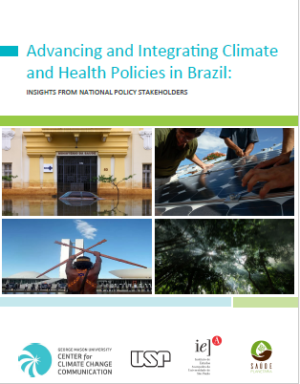Advancing and Integrating Climate and Health Policies in Brazil : insights from national policy stakeholders
Palavras-chave:
Public Policies, Brazil, Human Health, Climate Change, Climate and Health, Planetary HealthSinopse
Climate change is already significantly impacting human health and various sectors in Brazil and around the world. The climate tragedy in Rio Grande do Sul, the Dengue epidemic, the worsening of wildfires, and the historic drought in the Amazon in 2024 are just a few examples. However, existing Brazilian public policies are unable to provide solutions to the problems arising from the worsening climate crisis. This publication brings together concrete proposals for actions aimed at integrating climate and health policies in Brazil, including improvements in communication and education, expanding the production and dissemination of research and data on the impacts of climate on health and the economy, as well as on the benefits of climate action for health and other areas; and strengthening political governance for integrated country planning. The authors systematized these findings from interviews with 33 Brazilian stakeholders involved directly or indirectly in formulating national public policies. The research participants are representatives of the Executive, Legislative, and Judiciary branches, federal public agencies, NGOs, Think Tanks, and Academia. There is a consensus that climate and health policies should be more closely linked. The interviewees reflected on the national status of the policies, the ideals of integration, the barriers to progress, and the opportunities and strategies for overcoming the challenges identified. The Brazilian report is part of an international multi-country project led by the Center for Climate Change Communication, linked to George Mason University (Virginia, USA), and funded by the Wellcome Trust. In Brazil, it was conducted by researchers from the Planetary Health Brazil group based at USP's Institute for Advanced Studies.
Downloads

Downloads
Publicado
Licença

Este trabalho está licenciado sob uma licença Creative Commons Attribution-NonCommercial-ShareAlike 4.0 International License.


 Português (Brasil)
Português (Brasil)
 English
English
 Español (España)
Español (España)
 Français (Canada)
Français (Canada)
 Deutsch
Deutsch
 Italiano
Italiano



